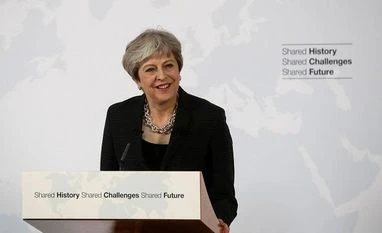British Prime Minister Theresa May's Conservative Party gathers today for its annual conference, dominated by questions about her leadership and splits on Brexit.
Four months after losing her parliamentary majority in a June snap election, May's grip on power remains fragile.
In Brussels, Brexit negotiations are moving painfully slowly, while at home, ministers still disagree on the shape of Britain's future outside the European Union.
Ahead of her arrival in Manchester, northwest England, May acknowledged the "disappointing" election performance, but emphasised that she had a programme that she intended to see through.
"Yes, we have to get the best Brexit deal — but we must also take action here at home to make this a fairer place to live for ordinary working people," she said.
Commentators will be watching for signs of rebellion, however, with all eyes on Foreign Secretary Boris Johnson.
More From This Section
His decision to set out his own vision of a clean break with the EU, just days before May's big Brexit speech in Florence, was widely viewed as a challenge to her authority.
"May needs to get through conference without further damage to her position," said Simon Usherwood, a politics expert at the University of Surrey.
May included a number of concessions in her Florence speech, which helped unlock the Brexit talks, although likely not enough to move the negotiations on to trade later this month.
But her call for a two-year transition period, in which Britain continued paying into the EU budget, failed to quell the in-fighting among her own cabinet.
It sparked a fresh war of words in the newspapers between allies of Johnson and finance minister Philip Hammond, who fears the economic damage of a sharp withdrawal.
Former party leader William Hague is among those calling for a truce, warning that the only person who benefited from the divisions was opposition Labour leader Jeremy Corbyn.
But Johnson used an eve-of-conference interview to step up the pressure once more, elaborating on his "red lines" for Brexit — notably that the transition period must be kept short.
"Most people can't understand what this conversation is all about. We left. We voted for that last year — so let's get on with it," he told mass-selling tabloid The Sun.
May had called the election in bid to boost her majority, but actually lost seats, leaving her dependent on a small Northern Irish party to stay in government.
As the weeks passed without a leadership challenge, her confidence has grown, and she now says she wants to fight the 2022 election as prime minister.
A YouGov survey of party members for The Times newspaper this week found 71 per cent thought she was doing well — although only 29 per cent believe she should stay on that long.
In May's favour so far has been the lack of a clear successor. "Dislike of her is not the same as having a preferred replacement," Usherwood commented.
)